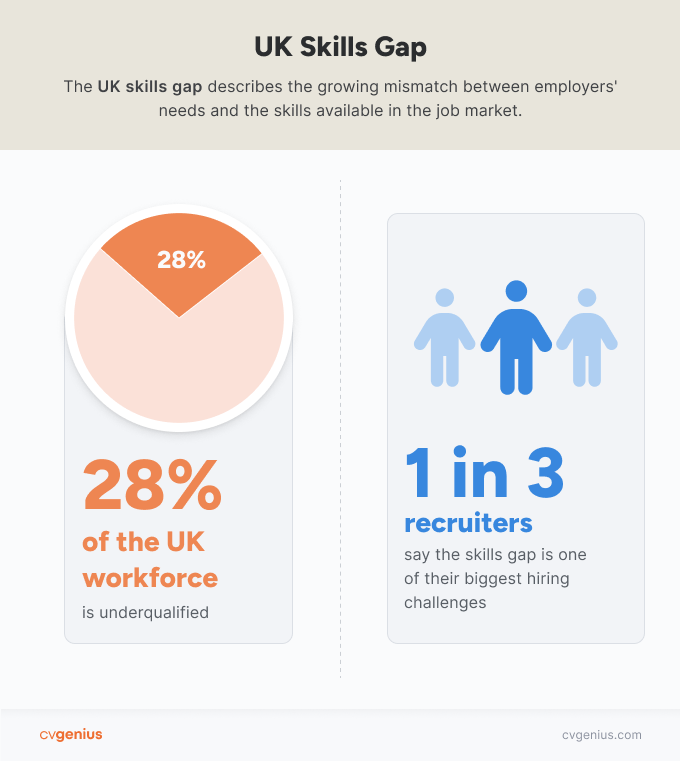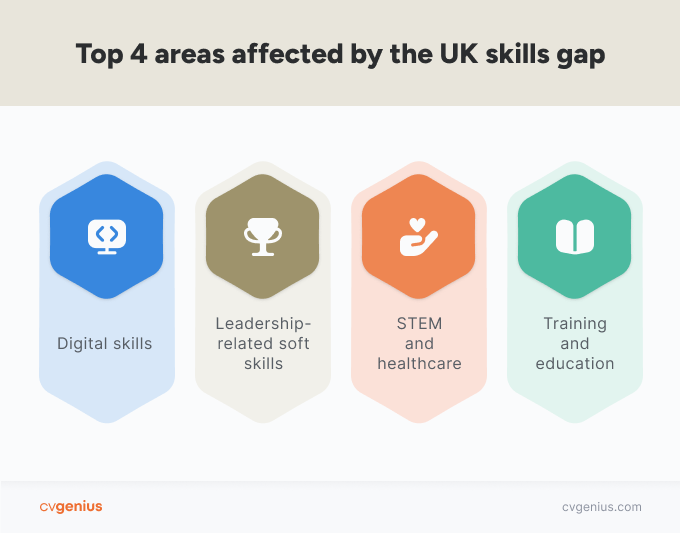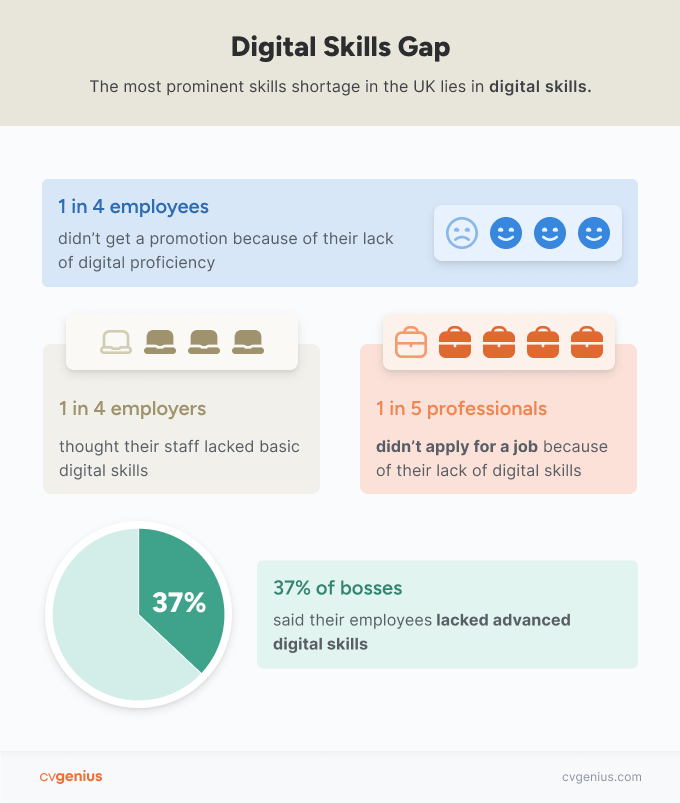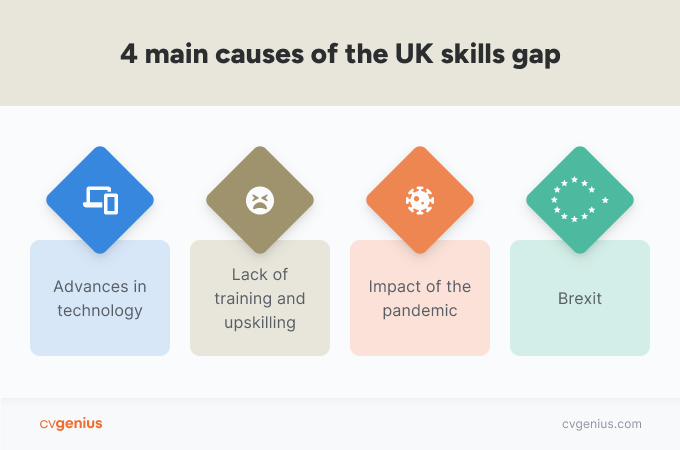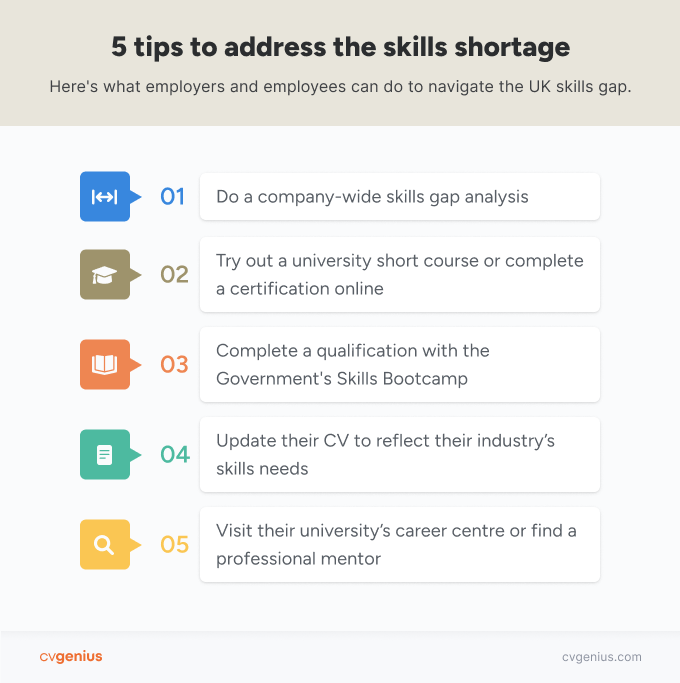The skills gap in the UK is making headlines and raising concerns for workers, employers, and policymakers alike.
As the divide between workers’ skills and employers’ needs widens, it’s not only capturing extensive media attention but also seriously impacting the UK economy.
But what exactly does the term ‘skills gap’ mean, and how does it affect you?
In this article, we’ll explore:
What is the UK skills gap exactly?
The UK skills gap describes the growing mismatch between employers’ needs and the skills available in the job market. This gap can involve general skills like basic digital literacy, management and leadership abilities, or industry-specific skills, such as those in science, technology, engineering, and mathematics (STEM) fields or education.
Several reports from the UK government, including the Levelling Up White Paper and the Department for Education’s (DfE) Skills for Jobs Policy Paper, have indicated how severe the skills gap has become and what needs to be done to address it.
Various independent reports have agreed with the government’s findings. For example, the Industrial Strategy Council predicts that, by 2030, 20% of the workforce may lack the necessary skills for their roles. Meanwhile, the OECD Skills for Jobs database goes further, suggesting that 28% of the UK workforce is already underqualified.
This issue has made the hiring process more challenging for recruiters struggling to find candidates with the necessary skills. In fact, a third of recruiters have reported a widening skills gap being one of their biggest challenges over the past year.
What general skills are Brits falling behind in?
The skills gap is a critical concern impacting several areas of work in the UK. Here’s a breakdown of the four skill areas most affected by the worsening skills shortage and the challenges they present:
1. Digital skills
While the skills gap spans various areas, the most prominent skills shortage lies in digital skills.
While the terms ‘skills gap’ and ‘digital skills gap’ are sometimes used interchangeably, it’s important to clarify that the skills gap is more extensive than the digital skills gap, which is only one part of the larger issue.
Extending beyond programming and computer science, the digital skills category includes a wider range of abilities, such as basic computer literacy and using office tools like Microsoft Word, spreadsheets, and presentation software.
This area also covers more specialised skills which are specifically required for certain jobs, like digital content creation. Digital skills are often broken down into basic and advanced.
UK workers appear to be aware of their digital skills shortage. According to a survey by AND:
- A majority (58%) of workers in the UK said they had personally felt the negative impact of the digital skills gap.
- 26% of UK employees indicated that they didn’t seek or achieve a promotion because of their lack of digital proficiency.
- One in five UK professionals (20%) revealed that their lack of digital skills stopped them from applying for a job.
- London is the worst affected area of the UK, where 73% of workers said they had been negatively affected by not having the required digital skills for a job.
Employers’ perspectives seem to match that of their employees. A 2021 YouGov employer survey revealed that:
- Nearly a quarter (23%) of UK employers thought that their staff lacked basic digital skills.
- 37% of UK bosses voiced that their employees lacked advanced digital skills.
It’s clear that the digital skills gap has wide-reaching effects on workers, businesses, and the entire UK economy. However, while the digital skills gap might be the most discussed, it isn’t the only skills shortage in the UK.
2. Leadership-related soft skills
After digital skills, the next most significant gaps in workplace skills are:
- leadership and managing others
- critical thinking and decision-making
- advanced communication and negotiation
As outlined in the Industrial Strategy Council’s UK Skills Mismatch in 2030 research paper, the above skills can be broadly categorised as leadership and management skills.
Often recognised as essential qualities for aspiring or experienced leaders in the career space, these soft skills are highly sought after by recruiters and business leaders. However, the Industrial Strategy Council’s study indicates that by 2030, approximately 22 million workers will lack these key leadership and management skills.
To further compound this, little is being done to close the soft skills gap within the UK workforce. According to the 2023 Essential Skills Tracker report led by Skills Builder Partnership, half (51%) of the UK workforce has missed out on opportunities to develop essential skills.
Their report further projects that failing to invest in these critical soft skills costs the UK economy about £22 billion annually.
3. STEM and healthcare
While STEM primarily refers to the four fields ‘science, technology, engineering, and mathematics’, it can also refer to healthcare professions like nursing and dentistry.
Despite the varying definitions, there’s an undeniable skills gap across both STEM and healthcare professions. As projected by the Industrial Strategy Council, 2.7 million workers will lack the necessary skills for their roles in at least one STEM and healthcare subject area by 2030.
While this skills gap doesn’t affect as many people as the digital skills gap, it holds great significance because STEM and healthcare include some of the most critical professions and provide essential services to society and the economy.
The growing demand for workers in these areas further highlights the concern, especially as there’s already a notable worker shortage across STEM and healthcare.
As of October 2023, ONS data reported that human health and social work positions alone account for 18% of all UK job vacancies, making it the most significant gap in any sector.
4. Training and education
The OECD Skills for Jobs 2022 results listed the Training and Education sector as having a large skill shortage in the UK, alongside the Scientific Knowledge and Medical Knowledge sectors. While this trend isn’t unique to the UK, it has progressively worsened over the last decade.
Further emphasising this problem, the Industrial Strategy Council noted that 4.3 million workers may be underskilled in teaching and training by 2030 — essentially, the ability to enhance others’ skills.
To effectively address the skills gaps in areas such as digital proficiency, leadership, STEM, and healthcare, the UK workforce requires comprehensive training and upskilling.
However, the shortage of qualified professionals to deliver this training poses a major challenge. If this trend persists, it may hinder the UK’s future competitiveness and productivity as a nation.
Other skills gaps
Other fields with a notable skills gap include construction, manufacturing, as well as transport and logistics.
4 root causes of the skills gap in the UK
Several factors are contributing to the UK’s skills gap. Let’s explore the main reasons below:
Over time, ongoing advancements in technology have outpaced current education and training efforts, leaving a sizable portion of the workforce lagging behind in essential digital competencies.
Furthermore, changing industry landscapes demand new skills that may not have been prevalent a decade ago. For instance, the rise of automation, artificial intelligence (AI), and data analytics has shifted many roles’ requirements, leaving individuals who haven’t upskilled struggling to keep up with the pace of change.
In fact, UK employers spend just half of the EU average on training per worker.
There is a clear disconnect and a lack of emphasis from employers on upskilling employees’ digital skills, despite 7 in 10 business leaders acknowledging a skills gap in their company.
This phenomenon is perplexing considering that, according to The Open University’s Business Barometer report, nearly three quarters (72%) of UK employees admitted that their skills shortage was causing an increased workload on other staff, and 78% reported that it is limiting output, profitability, and company growth.
These findings suggest a lack of alignment between employers’ perceptions of the skills gap’s impact and the measures they’re taking to address it.
To address this skills shortage, the government is introducing new funding initiatives, such as the Local Skills Improvement Fund, and urging businesses to provide internal training for workforce upskilling. However, the impact of these initiatives remains unclear.
These shifts are largely because of the unexpected and rapid loss of skilled workers during and after COVID, primarily because of early retirement or health reasons.
The UK skills gap can be partly attributed to the rise in economic inactivity as the number of working-age people (16-64) in employment or actively seeking employment struggles to reach pre-pandemic levels.
Some of our key findings on this include:
- In Q2 2023, the leading cause of economic inactivity was long-term illness (30%), followed by education (25%), looking after family members/home (18%), and early retirement (12%).
- Economic inactivity due to long-term illness, including long-COVID, has continued to rise since COVID, nearing 2.6 million people in Q2 2023, the highest since records began.
- The Institute for Fiscal Studies (IFS) estimated that around 4.4 million working hours were lost per week due to COVID-related long-term illness in 2021, translating to a loss in earnings of nearly £1.5 billion a year.
While long-term illness is one reason for economic activity that can be attributed, at least partially, to the pandemic, the other is early retirement.
Some of the main reasons older workers chose to retire early include:
- a response to furlough and COVID redundancies
- a shift to remote working
- an increase in personal wealth because of reduced spending and ballooning asset prices
The number of economically inactive people increased by half a million from 2019 to 2022 and is expected to increase by a further 317,000 by 2026.
The UK is also the only developed nation where economic inactivity has continued to rise since COVID, and this increase is particularly prevalent amongst the youngest and oldest age groups.
For example, a 2022 report from the Bank of England asserted that fewer people coming from the EU is worsening the worker shortage.
In particular, 46% of companies in the transport and storage industry have found it harder to hire because there are fewer EU applicants. This same problem is also happening in the administration (40%), education (39%), and arts (36%) industries.
Furthermore, a study from the Centre for European Reform believes the end of free movement has left the UK short of 330,000 workers, making hiring today an even bigger challenge for businesses.
According to the Learning and Work Institute, by 2030, the UK skills shortage will cost the country £120 billion thanks to a total shortfall of 2.5 million highly skilled workers.
How UK employers and employees are addressing the skills gap
The skills gap is a growing obstacle for both employers and employees that’s negatively affecting how well companies can do their work and how employees can advance in their careers.
Employers are finding it harder to stay competitive and efficient because their teams can’t make the most of the latest tech advancements or fully adapt to new ways of working.
To effectively address and navigate the skills gap as an employer or an employee, here are some tips that you can follow:
Bridging the UK skills gap for employers
Employers hold a pivotal role in closing the skills gap. Below are three suggestions to help employers bridge the skills shortage in their companies:
1. Conduct a skills gap analysis
To assist you with understanding your employees’ needs and identify specific areas in which your workforce lacks proficiency, try using a skills gap analysis to pinpoint the gaps that need to be addressed.
A skills gap analysis is an employer assessment of the workforce to determine where their employees lack the required skills needed to succeed at their jobs.
After identifying skills of value and measuring the skill levels of employees through surveys, assessments, and performance reviews, you can use the data to realign your future training and hiring strategies.
2. Offer tailored training programmes
To ensure your training efforts are effective, tailor them to the specific needs of your employees. You can do this by basing your efforts on the data collected in your skills gap analysis or by asking your employees what kind of training they want.
Investing in employee development will also improve job satisfaction and encourage loyalty and commitment to your organisation.
3. Collaborate with education providers
To provide quality training that actually helps address the skills gap in your company, partner with educational institutions, online learning platforms, or reputable training providers to offer relevant courses for employees.
By collaborating with established education providers, you ensure that your employees are getting the training they need to help your business grow. Partnerships such as these can help secure a return on your investment.
Navigating the UK skills gap as an employee
The skills gap can be a barrier to career advancement. Without adapting to the ever-changing skills needs of the workplace, workers might find themselves stagnating in their careers, unable to take advantage of opportunities for promotions or for exploring different roles.
However, the current UK skills gap also presents a unique opportunity. Here are some key tips to help workers leverage their professional growth and navigate their careers successfully.
Tips for professionals navigating the skills shortage
- Recognise skill areas where you lack proficiency and strategically invest in your own development. Consider taking an online or in-person short course from a university, subscribing to a learning platform like Skillshare or Udemy, or completing free certifications from relevant and reputable providers such as Coursera or Hubspot Academy.
- Take advantage of the UK Government’s Skills Bootcamp to receive free technical certification for eligible jobseekers.
- Evaluate the skills needs of your organisation and industry and showcase attained skills on your CV and cover letter that present yourself as more hireable or a strong candidate for promotion.
- Demonstrate a commitment to continuous learning and an ability to adapt to evolving needs by highlighting completed courses and certifications on your LinkedIn profile.
- Find a professional mentor or, if you’re a student, visit your university’s career centre to find out what practical skills might help you beyond the classroom and the early stages of your career.
Seizing the chance to upskill can position employees as valuable assets within their organisations and present themselves as more qualified for upward career moves.
By foreseeing the skills needs of their organisation, field, or job market as a whole, employees, candidates, and students can curate their education and training to boost their career advancement and job prospects.
References
- AND, ‘The Nature of the UK’s Digital Skills Gap’
- Centre for European Reform, ‘Early Impacts of the Post-Brexit Immigration System on the UK Labour Market’
- Department for Education, ‘Skills For Jobs’
- Education and Training Foundation, ‘So What is the FE Sector?: A Guide to the Further Education System in England’
- Financial Times, ‘Chronic Illness Makes UK Workforce the Sickest in Developed World’
- Gleeson Recruitment Group, ‘Why is There a National Skills Shortage in the UK, and What Does it Mean for Businesses?’
- Industrial Strategy Council, ‘UK Skills Mismatch in 2030’
- Institute for Fiscal Studies, ‘Long COVID and the Labour Market’
- Institute for Fiscal Studies, ‘Recent and Future Patterns of Work Around State Pension Age’
- Learning and Work Institute, ‘Employer Investment in Training Plummets 28% Since 2005, Putting the Government’s Ambition of a High Skill, High Wage Economy at Risk, Report Warns’
- Learning and Work Institute, ‘Local Skills Deficits and Space Capacity’
- Monster, ‘Flexible Future: UK Hiring Outlook 2022’
- OECD, ‘Skills for Jobs 2022’
- Office of National Statistics, ‘Economic Activity by Reasons (Seasonally Adjusted)’
- Office of National Statistics, ‘Hospitality Businesses are Most Likely to be Struggling to Fill Vacancies’
- Office of National Statistics, ‘Population Changes and Economic Inactivity Trends, UK: 2019 to 2026’
- Office of National Statistics, ‘Vacancies by Industry’
- Skills Builder Partnership, ‘Essential Skills Tracker 2023’
- The British Institute of Recruiters, UK Skills Shortages: An Overview of Sectors and Jobs in High Demand’
- The Open University & British Chamber of Commerce, ‘The Business Barometer 2023’
- UK Government, ‘£165 Million Fund Launched to Transform Local Skills’
- UK Government, ‘Levelling Up’
- WorldSkills UK, ‘Disconnected: Exploring the Digital Skills Gap’
About CV Genius
CV Genius is the go-to resource for UK job seekers of all industries and experience levels.
With an intuitive CV maker, a diverse collection of free industry-specific resources like cover letter examples and CV templates, as well as guides on how to write a perfect CV and cover letter. CV Genius has been featured in multiple renowned publications, such as the BBC, HR.com, MSN, Forbes, and Glassdoor.
CV Genius and its team of career advisors and HR specialists can help anyone make an effective job application and earn more interviews.
For media queries or concerns, please contact us.


